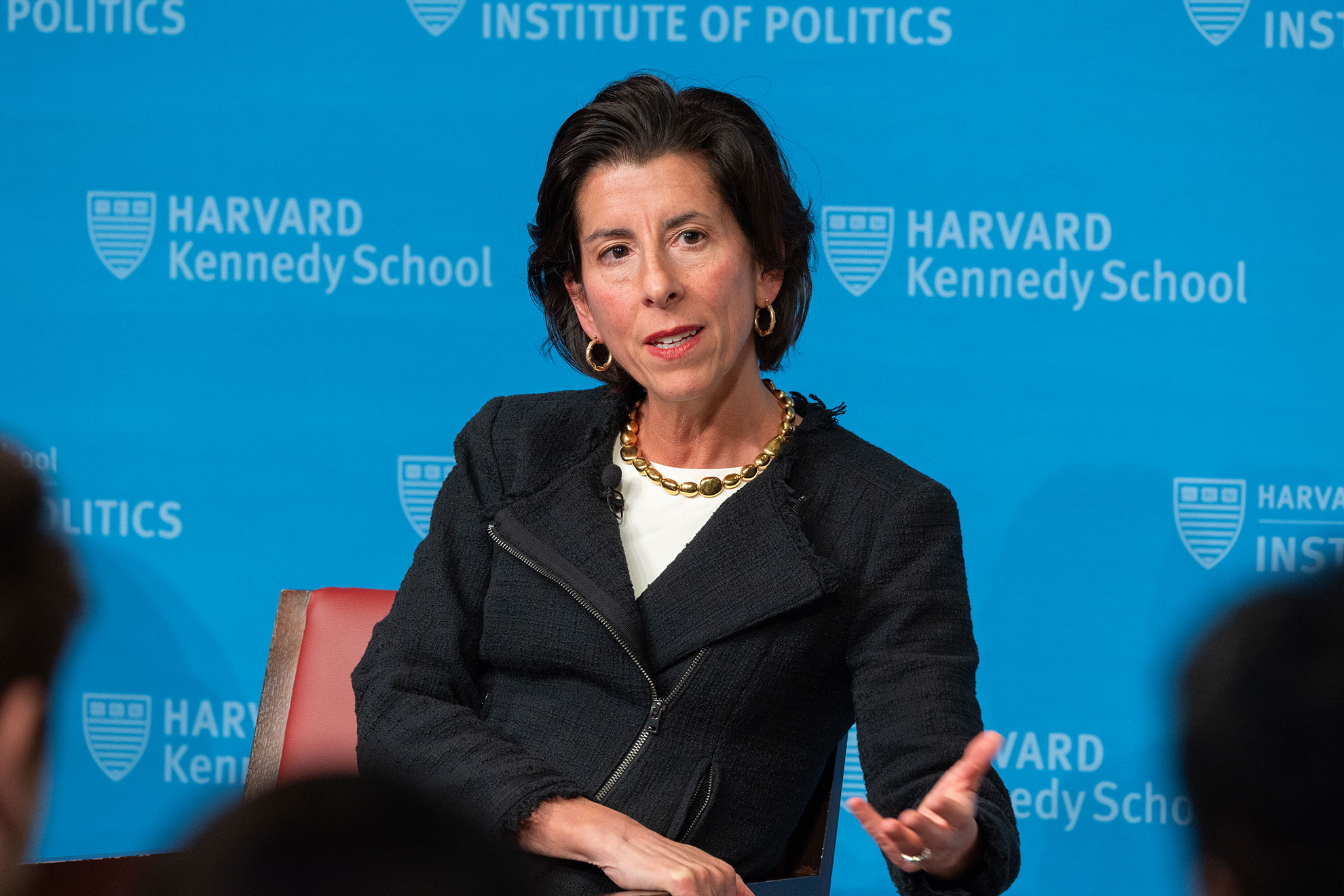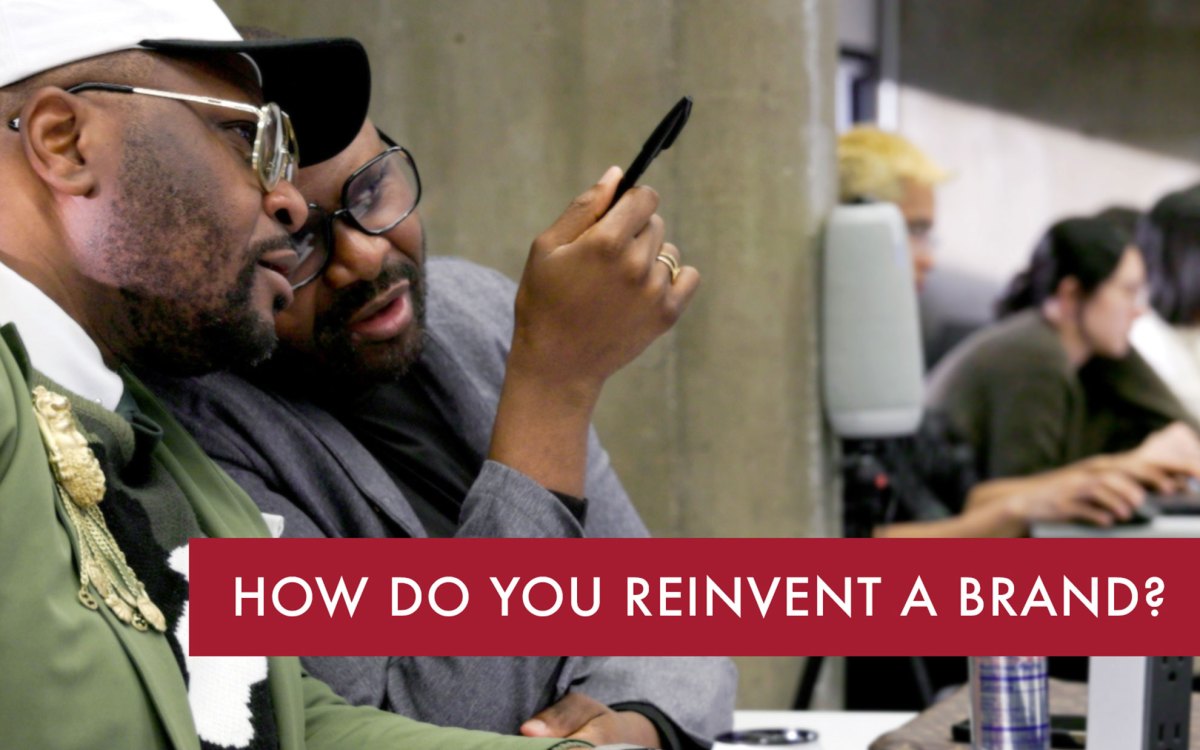
Gina Raimondo.
Photo by Martha Stewart
When making positive change, sometimes you ‘break things’
Key is to avoid hurting people in process, Gina Raimondo says
If you want to make things better, says Gina Raimondo, that means things are going to have to change — and sometimes that means you “break things.”
For example, the former U.S. Commerce secretary and Rhode Island governor said that when she was leading the Ocean State, she cut taxes every year, raised the state minimum wage, and made community college tuition free. She also cut 30 percent of the state’s regulations.
“I don’t think we should just accept things because they’re the way things have been done,” Raimondo ’93 said last week during an Institute of Politics forum on “The Future of U.S. Competitiveness.”
This willingness to make changes, she acknowledged, may sound similar to the tactics of Elon Musk’s DOGE. The difference? “Execution matters,” she said. “You can’t hurt people in the process.”
That focus on ensuring fairness and opportunity for regular Americans came early and has remained with her throughout her political career.
The granddaughter of immigrants who stressed hard work, Raimondo, who was instrumental in shaping the Biden administration’s Infrastructure Investment and Jobs Act, credited her large Italian family with getting her into politics. When Ronald Reagan was elected president, she recalled, “My dad kept saying ‘What about the little guy who gets up in the morning and goes to work? Who’s sticking up for us?’
“As I got older and I saw that American Dream being out of reach,” she said. “It motivated me to get involved in politics.”
The IOP discussion with Jeff Liebman, director of the Taubman Center for State and Local Government and Robert W. Scrivner Professor of Social Policy, turned to Raimondo’s tenure as Commerce secretary. The two first focused on the early days when supply chains slowed as COVID raged. “The first thing we had to do was understand the complexity of supply chains,” she said.
In response to endless calls about various essentials that were suddenly not available, “We built spreadsheets for critical supply chains, like pharmaceuticals — and then, under President Biden’s leadership, we got to work making friends with other countries,” she said.
Citing Biden’s belief, she said, “America can’t and shouldn’t go it alone. America is best when we make friends; he sent us to Southeast Asia to build relationships with Indonesia, with the Philippines,” and beyond.
In addition to forging or strengthening those relationships, the Biden administration responded with the CHIPs and Science Act, aimed at making scientific essentials domestically. Liebman asked her how that played out.
“Most semiconductors are a commodity, and many of them are made overseas — a lot in China,” Raimondo responded. “It wouldn’t be a national security disaster if there was a backlog of iPhones. But artificial intelligence — all AI — runs on leading-edge chips. So much of our intelligence-gathering capacity depends on leading-edge chips. That directly affects our national security, and we make zero” of the chips in question.
“By 2030, we’ll be making a quarter of those chips. That’s a success,” she said.
She also defended the legislation’s fiscal responsibility. “We insisted that for every dollar we put out there, $10 of private-sector dollars come in,” she said. “When we left, we had about 13 private-sector dollars for every dollar that we put in.”
Such self-reliance is essential, she said. Citing China’s BYD electric cars, which are heavily subsidized by the Chinese government and then sold inexpensively around the world, she said, “Free trade is great if everyone plays by the rules. China does not play by the rules. I think having more reciprocity is reasonable.”
Looking back on her time with the Biden administration, she acknowledged mistakes, including — perhaps — too many compromises.
“Politics is not perfect,” she acknowledged. “We did get a lot done, though. People who make those critiques may not know how hard it is to get things done in a 50-50 Senate and a tiny margin in the House.”
Raimondo also defended Biden’s stimulus act, which some blame for inflation. “I was the governor of Rhode Island during COVID,” she said. “In the couple of months after COVID broke out, in a state of about a million people, I had 110,000 file for unemployment insurance.”
Recalling the “pit in my stomach,” she worried, “How am I going to get these people back to work?
“It was really scary,” she said. “It’s easy to say the stimulus shouldn’t have been so big it led to inflation. But nobody says if it wasn’t big enough that unemployment would have continued.”
She also defending tacking so-called social programs onto economic ones. “Companies that wanted our money needed to find workers,” she said. “They’re not going to have enough workers without women, and they’re not going to get women without a childcare plan.
“They weren’t social programs. They were labor market programs designed to be a steward of taxpayer money.”




